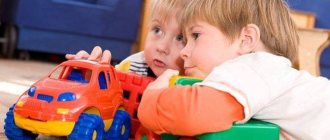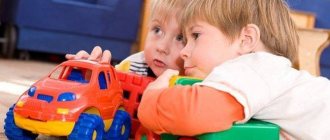Basic life cycles in the process of human development
Socialization as the process of a person’s adaptation to generally accepted social norms and rules of behavior covers all existing phases of human development as a biological and social being.
These developmental phases are also called the main life cycles of human development. There are four such cycles:
- The period of childhood - which includes the time period from birth to puberty, this cycle is characterized by the development of basic skills accepted in human society;
- The period of adolescence (from 14 to 20 years) - including preparation for the active working period of a person’s life;
- The period of maturity (from 18 to 60 years) is the most active period of a person’s life, characterized by the active development of all aspects of life.
- The period of old age (60 years and older) is a period of decreased human activity, characterized by exit from the active working period.
Are you an expert in this subject area? We invite you to become the author of the Directory Working Conditions
Stages of personality socialization
It has been noted that one of the main goals of socialization is to overcome one’s egocentrism. Entering any social group requires an understanding that “you are not alone.” This is considered one of the signs of growing up. It is known that a child up to a certain age perceives himself as the center of the universe, and this is his natural state. Subsequently, we observe what is called youthful maximalism: the teenager continues to consider himself “the very best,” the one and only, but is faced with an abundance of the same “one and only” around him. This leads to conflicts, often serious ones.
Individuals who have not undergone socialization for some reason retain for a long time the characteristics characteristic of children or “newcomers.” Those around them perceive them as infantile and narrow-minded people, but in reality everything is more complicated. If in adulthood the passion inherent in adolescents for learning new things, active communication, and mastering new skills and abilities remains, then this can only be welcomed. At the same time, egocentrism and difficult experiences of one’s failures are clearly undesirable signs for a mature personality.
An example of insufficient socialization in adulthood is belief in “alternative histories” - the writings of Nosovsky and Fomenko, Chudinov and other pseudoscientific freaks. The point here is not only about political, “patriotic” and selfish motives. It’s just that a child, just starting to explore the world and discovering something new, strives to share his discovery with others; parents and other older members of society, to play along with him, share his joy.
During his school years, a teenager is faced with the impossibility of being a pioneer in the modern world: everything he learns about has already been discovered by someone, and his “discovery” is no longer of great value to others. A mentally healthy person gradually gets used to this situation and finds unexplored areas where he can show his skills and give something new to society. And a mentally disabled person experiences rejection from this situation; Instead of searching for unexplored areas, he is eager to “rediscover” what has already been discovered, to create a sensation and receive the laurels of a discoverer, which, as he is sure, simply must belong to him.
The biography of Anatoly Fomenko, the author of the famous pseudoscientific “New Chronology,” very clearly presents us with just such a person - an unsocialized intellectual who, for the sake of the honor of being a discoverer, is ready to commit any lie and achieve his goal by any means. For a long time he eked out the life of a “lesser” mathematician, compiled standard textbooks on geometry for students and was content with a modest salary. In the end, he got tired of it, he realized that the modest and routine work of teaching did not bring happiness, and decided to do something loud and sensational. In his native field, geometry, it is very difficult to become a discoverer, but history is a different matter. Written in collaboration with the equally unsocialized intellectual Gleb Nosovsky, “New Chronology” instantly became a bestseller; Many uneducated readers of this work seriously call Fomenko a “prophet.”
It was said above that school becomes an important environment for primary socialization. Indeed, the task of school is not only to provide some knowledge on various subjects, but also to teach how to live in society. In many countries, special techniques are used for this purpose. For example, in the United States, schools do not have stable classrooms; When a student enrolls in school, he chooses which subjects he will study, and at each lesson he finds himself in a new classroom, in a completely new team. Such socialization is very useful, especially in the USA, because a significant part of the population of this country lives in very small settlements where “everyone knows each other,” but excessive attachment to “one’s own corner” can create problems in the future when it is necessary to change place of residence (in connections with study, work, etc.).
Most Russians live in cities and towns with significantly larger populations, so they do not feel an urgent need for this type of school in our country. At the same time, another type of socialization is required - the ability to work in a stable team, which a Russian-style school can handle quite well.
Main stages of socialization
According to these life cycles, there are four main stages of socialization:
1. Primary socialization, which corresponds to the stage of socialization of infancy; 1.Secondary socialization, coinciding with education; 1. Socialization of maturity is the stage at which the individual turns into an independent and independent person, is capable of economic independence and is ready to start a family. 1. Socialization of old age is the stage at which the individual’s activity gradually decreases and he has the right to count on the help and support of the state and his own children.
Note 1
All these stages are associated with the individual acquiring a new social status, mastering and living new roles. The duration of each of these stages and its content depend on the characterological characteristics of the individual and the level of development of the society in which he lives.
Finished works on a similar topic
Course work Phases and content of the socialization process 470 ₽ Abstract Phases and content of the socialization process 280 ₽ Test work Phases and content of the socialization process 200 ₽
Receive completed work or specialist advice on your educational project Find out the cost
Definition of socialization
Before discussing this topic, it is necessary to understand what socialization as such is.
Psychological science says that socialization
is the process of an individual’s entry into a social system, mastering its norms, rules of behavior, values, knowledge and skills, and psychological attitudes.
Another, “unofficial” definition says that socialization is what allows a person to live in harmony with the world around him. How is this harmony achieved?
Man is the only creature who, let’s say, is not born by himself. Any animal at birth belongs to a certain species - the same one to which its parents belonged. And only a person, in order to obtain the characteristics inherent to his species, is obliged to undergo a long and complex process of socialization, individual forms of which occur throughout his entire life. In fact, if a newborn is left in the forest and there he randomly survives, then he will not learn to speak, or build, or even hunt. Certain forms of learning, of course, exist in many animals, but they take place only for a short time; an animal that has not undergone “socialization” still has a great chance of surviving and producing offspring, since the basic skills are embedded in its instincts. Long and complex socialization is observed only in higher primates, which proves that this phenomenon did not arise suddenly, but was inherited from our animal ancestors and evolved over thousands of years.
Socialization results
In the process of socialization, social norms, values and requirements move into the internal plane and become the basis of human behavior. In the process of socialization, there is interaction between the individual and society, coordination of mutual requirements and expectations. At the same time, the individual does not simply assimilate and reproduce social patterns; on the contrary, in the course of socialization, the actualization of its capabilities, potentials, expansion and deepening of self-awareness is carried out, i.e. personality development occurs.
Indicators of successful socialization of an individual are:
- Inclusion of the individual in the system of social relations.
- Expanding and deepening the individual’s connection with people and various spheres of society.
- Mastery of social experience, its appropriation and transformation into one’s own values, attitudes and orientations.
- Active activity of the individual with his active involvement in the social sphere.
- Active reproduction of the system of social connections.
It should be emphasized that the main vector of socialization is a positive focus on morality and law. Deviation has the opposite direction - the deviation of the subject’s behavior from social norms.
Mechanisms of socialization
The mechanisms of socialization include: socio-psychological and socio-pedagogical.
The first group includes : imprinting, copying, reflection, existence.
Imprinting is the creation of attachments to what is seen for the first time; in the future, a person experiences the joy of recognition and emotional attachment. Copying behavior is adopting behavioral norms directly from the people around you. Reflection is the creation of a system of behavior based on internal logical reasoning. Existence is the acquisition of skills, including language, under the influence of the immediate environment.
The second group includes : traditional, institutional, interpersonal, stylized.
In the traditional mechanism, the individual’s environment does not make any specific efforts for socialization and socialization occurs spontaneously. Institutional is socialization in kindergartens, schools and other public institutions of socialization. The interpersonal mechanism works in conditions of emotional closeness, when an individual’s behavior is influenced by an emotionally significant subject and this influence is purposeful. The stylized mechanism is the influence of the subculture in which the individual is included.
Organizational socialization
Organizational or professional socialization is the process of an individual mastering the skills and attitudes adopted in an organization for the successful performance of basic functions, as well as for establishing relationships with colleagues.
At first, upon entering the workforce, newcomers become familiar with generally accepted standards of behavior in the organization, master the jargon, communication style, learn to comply with the dress code, and perceive the balance of power between people. This is also the socialization of the individual, and very important - often we have problems with work not because we are bad professionals, but only because even an excellent professional who is unable to establish relationships with people will bring nothing but harm to the organization.
To improve organizational socialization, it is customary for companies to organize various joint holidays, field trips, and conduct games and activities to improve communication between colleagues.
The ability to successfully fit into any system is useful to everyone, and one cannot think that socialization is important only for those who are not successful and do not fit into the framework. Since any framework has its values exclusively in a given period of time, and there is no guarantee that tomorrow the concept of the norm will not change, and that yesterday’s successful person will not find himself on the sidelines of life with his mossy concepts of the norm.
Socialization factors
By scale, factors are divided (A.V. Mudrik) into:
- megafactors;
- macro factors;
- mesofactors;
- microfactors.
Megafactors
These are global factors that influence any person: space, Earth, humanity.
Space is considered as a kind of spatially ordered structure of the Universe, which includes all space and all material objects and forms of energy in it. Man is part of the Universe. Humanity has already gone beyond the boundaries of planet Earth, and, although it is only taking its first steps, it has the prospect of becoming a transformative force on the scale of the Solar System, the Galaxy and the Universe as a whole. In this regard, understanding one’s place in the universe and taking responsibility for human actions on a global scale influence the formation of the individual and his actions in society.
Planet Earth is the homeland of our civilization. The vast majority of people, with the exception of a few, spend their entire lives on Earth. In this regard, the physical and biological living conditions dictate a person’s part of his needs: the need for clothing, shelter, food supplies. And these needs already dictate the very need for social interactions, both as a method of more effective activity than individual activity, and as well as the forms of these interactions.
Society as a whole, humanity, in the words of V.I. Vernadsky, has long been a geological force transforming the appearance of the planet. In this regard, the individual person begins to be influenced by the consequences of such a transformation, primarily in the form of the technosphere. Humanity exerts a global influence on its internal processes, although this influence today is predominantly unsystematic.
Macro factors
This is a state, country, society (in the sense of a specific cultural and economically determined community).
Country as a basically geographical concept defines, to a first approximation, the territory that a person considers as “his own,” building his relations on the basis of territorial affiliation. Natural and climatic features influence human behavior both directly (through temperature, available crops for cultivation and nutrition) and indirectly (through transport accessibility, economic prospects for activity, etc.).
The state is a political concept. A person acts as an object and subject of civil rights, masters forms of legal interaction with other people. A citizen has a number of fixed obligations to the state, and vice versa, the state has a number of obligations to each citizen.
Society is a direct participant in the socialization of a person as a source of norms, rules, and guidelines. As a subject authorizing and evaluating various forms of behavior, and as an object of redistribution of resources and information regarding an individual and social groups of various sizes. Each society has a specific set of culturally and historically determined norms; in this regard, the circumstance arises that when moving to a new society, an individual may experience the need for new socialization. Society has a structure of strata (sometimes castes, as in India), belonging to which leaves its mark on the norms of behavior with others, the volume and structure of knowledge necessary for assimilation, value attitudes, etc.
Mesofactors
This is an ethnic group, a region, a type of settlement, and means of communication (including mass).
Ethnicity as a national-cultural community is the bearer of traditional values, a genetically determined appearance accepted as the norm, and, most importantly, language as the basis of thinking and the basis for interaction with culture. Here ideas about beauty, consumption standards, housing features, methods of self-realization, etc. are formed. That is, a person acquires concepts about vital needs and the nature of satisfying these needs on the basis of social interaction and acquired mental values. The spiritual makeup of an ethnic group largely determines the main status of a person before the start of professional activity.
The region of residence can be described as a “small homeland”, i.e. This is the part of the planet where the first years of a person’s life pass, which he perceives as directly his territory. It is known, for example, that people who frequently move at the age of 10-15 years do not have an image of their homeland in their psyche and do not acquire it in the future. The region of residence provides specific life examples of the interaction of large groups of people, their influence on nature, and contributes to the formation of human interaction with specific phenomena of living and inanimate nature.
The type of settlement mainly influences the formation of the nature of interaction with living and inanimate nature, and the technosphere. It influences the availability of medical, educational and other needs and related services, local mobility, and the frequency and strength of social contacts and connections. Socialization in cities takes place with a huge concentration of the population, people live literally on top of each other (multi-story buildings), the nature of social interactions is highly anonymous, contacts are frequent and massive, the requirements for compliance with hostel standards are of increased rigidity. In this regard, the scale of criminalization of society and opportunities for criminal socialization are growing. The larger the city, the more clearly these features appear. In rural areas, population density is significantly lower. The frequency of social interactions is several times lower and acquires greater value, personal significance and depth than in the city.
Mass communication media (MSC) are technical means (print, radio, cinema, television) that disseminate information to quantitatively large, dispersed audiences. They implement a mechanism for individual and group selection, evaluation and interpretation of reported information. When considering social media as a mesofactor of socialization, one must keep in mind that the direct object of influence of the flow of their messages is not an individual, but the consciousness and behavior of large social groups, i.e. mass consciousness and behavior.
Microfactors of socialization include school, family, peer group, etc.
During training, the student becomes familiar with various facets of the culture accumulated by humanity, gaining knowledge about the outside world. And a huge layer - the inner world of a person - remains virtually outside the boundaries of school curricula.
Modern school teaches us to exist in the world of knowledge, skills, abilities, and not to live among people. Interaction with wildlife, especially in urban schools, is developing poorly.
The parental family is crucial in the formation of the emotional world, self-awareness and moral foundations of the individual in the first years of life. If this is not done or done poorly, it is extremely difficult to make up for the loss. Later, especially in adolescence, parental attention noticeably weakens, giving way to other factors - school, peers, etc.
The need to communicate with peers exists at any age. Already a six-month-old child responds with crying to the crying of his peer. At one and a half years old, children can smile at each other and exchange toys. For older preschoolers, communication is simply necessary. A child deprived of such communication loses in his communicative development.
Although children learn language mainly from adults, some intuitive and communicative abilities are formed only in communication with peers.
Socialization functions
Socialization plays an important role for both the individual and society. The main functions of socialization are the following:
- For the individual : a comprehensive, time-extended entry into the objective world - a separate part of society, a family or other community. Socialization makes it possible to understand oneself and interpret the behavior of other people, and interact with others.
- For society : socialization is one of the factors of normal reproduction of society. Despite the fact that people are constantly born and die, socialization makes it possible for society to reproduce itself and is a condition for the preservation and development of social culture.
Socialization structure
Socialization is a two-way process, including, on the one hand, the assimilation by an individual of social experience by entering into a social environment, a system of social connections, on the other hand, the process of active reproduction of a system of social connections by an individual due to his active activity, active activity, active inclusion into the social environment. Thus, in the structure of socialization two interrelated processes can be distinguished:
- The process of internalization of social experience (social typification) – the subject’s assimilation of social norms, values and standards of behavior.
- The process of exteriorization (individualization, autonomization) of social experience is the active recreation by a person of acquired experience in the process of independent activity, behavior and communication, the reproduction by the subject of social relations through his own activity.
Similar works
- Socialization as a factor in personality development: stages, methods and means
- Socialization as a factor in personality development: social dynamics
- Socialization as a factor in personality development: stages, methods
- Socialization as a factor in personality development: definition of the concept
- Socialization as a factor in personality development: the concept of personality
- Socialization as a factor in personality development: concept and essence
- Socialization as a factor in personality development: personality formation
- Socialization as a factor in personality development: ways and means
- Socialization as a factor in personality development: institutions of socialization
- Socialization as a factor in personality development: personality and social environment
- Socialization as a factor in personality development
- Socialization as a factor in personality development
- Socialization as a factor in personality development: socialization processes
- Socialization as a factor in personality development: social environment
- Personality and politics: factors of political behavior
- Personality and politics: types of personalities in politics
- Socialization as a factor in personality development: stage and methods
- Socialization as a factor in personality development: means of socialization
- Socialization as a factor in personality development: essence and content
- Socialization as a factor in personality development: the process of formation
Bibliography:
1. Andreeva G.M. Social psychology: Textbook, 2003.
2. Socialization of the individual in society [Electronic resource]. / Access mode: https://www.grandars.ru/college/sociologiya/socializaciya-lichnosti.html
3. Stages and mechanisms of socialization [Electronic resource]. / Access mode: https://www.grandars.ru/college/sociologiya/mehanizmy-socializacii.html
4.Structure of personality orientation [Electronic resource]. / Access mode: https://studopedia.net/10_49037_struktura-napravlennosti-lichnosti.html
5. Socialization of the individual. Stages of personality socialization [Electronic resource]. / Access mode: https://www.edu-psycho.ru/socializaciya-lichnosti.html
Attention!
If you need help writing a paper, we recommend turning to professionals. More than 70,000 authors are ready to help you right now. Free adjustments and improvements. Find out the cost of your work
Free estimate
0
Size: 31.28K
Downloads: 118
02.04.15 at 17:58 Author:semina1996
Liked? Click on the button below. It's not difficult for you
, and we
are pleased
).
To download test papers for free at maximum speed, register or log in to the site.
Important! All submitted Tests for free downloading are intended for drawing up a plan or basis for your own scientific works.
Friends! You have a unique opportunity to help students just like you! If our site helped you find the job you need, then you certainly understand how the job you add can make the work of others easier.
Add a job
If the Test work, in your opinion, is of poor quality, or you have already seen this work, please let us know.










